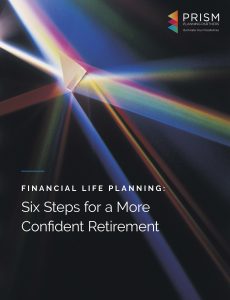If you’re within a decade of retirement, already retired, and/or a small business owner in Libertyville, Illinois you need a comprehensive financial plan to help you save for retirement.
Are you on the right financial path? Contact Prism Planning Partners for a consultation!
But it may not be clear how a comprehensive financial plan helps you save. After all, you might already be socking away as much as you can in retirement accounts.
Here’s a quick rundown of how a financial plan helps you save for and manage your retirement.
A Financial Plan Brings your Goals to the Forefront
When most people think about a financial plan, they likely think of money. But in fact, a financial plan is much more about goals. To save and manage your retirement money effectively, you need to have a clear sense of your goals in retirement.
After all, if you plan to travel extensively, you’re going to need sufficient funds to support that. But if you plan to downsize and then run a business, your financial needs may be completely different.
The road to goal achievement is to articulate what you want to do. Then you save and plan to get there.
A Financial Plan Provides a Blueprint for your Retirement Budget
Everyone needs a budget. A good budget is a kind of cash flow statement for your personal finances every month, letting you know what you spent, in which categories, versus your income.
You need to know how much you spend and on what in order to manage your finances. If your spending exceeds your income, a budget lets you see places where you could economize. If you have income left over from monthly expenditures, it lets you see how much, so you can decide whether to use it immediately or save it.
If you’re not yet retired, you need to forecast your retirement expenses and income to make sure you’re on the right track. Many people assume their expenses will be less in retirement. But that’s not always the case.
Few expenses reliably fall – commuting to work may be one. But other expenses inevitably rise – you may be spending more on travel, for example. Healthcare expenses are a major retirement expense that will likely increase and need to be factored into a budget. Senior citizens often need more medical care, not less.
So how do you forecast a retirement budget? First, forecast your expenses in every current spending category. If you have a mortgage, for example, will it be paid off in retirement, or still require a monthly check?
Second, forecast your retirement income. How much can you withdraw from any retirement savings, for example? A handy rule of thumb is that folks can withdraw 4 percent annually over a 30-year period without running out. So if you have $500,000 in retirement funds, you could withdraw $20,000 per year comfortably.
Get an estimate of your Social Security benefits from the Social Security Administration. If you are eligible for any pensions or other retirement benefits, add up the estimated benefits.
Third, compare your forecast expenditures and your forecast retirement income. This will let you know if you’re on track for retirement. If not, a financial planner can help you manage to save more or reduce expenses.
Develops a plan for your retirement portfolio
Needless to say, retirement savings portfolios are likely a key component of everyone’s retirement plan. A financial plan can help you manage the portfolio appropriately in the following ways.
Savings
The question of how much to save for retirement is a big issue! A financial advisor can advise you on how much to save for a comfortable retirement and what to invest in.
Asset Allocation
Portfolios are generally divided among several asset classes, such as stocks and bonds/cash, to maximize returns while minimizing risk.
Stocks provide a high level of returns historically, on average, of roughly 8 percent per year. But stocks are also risky, as stock prices fluctuate. The broad-based stock market averages drop as well as rise, and if they drop, your stocks lose money.
Bonds and cash counterbalance that volatility and risk by being stable investments. But their drawback is low returns. Currently, with interest rates at historic lows, they don’t keep pace with inflation.
One common strategy is to weight stocks and bonds/cash differently depending on your age. When you’re young, stocks provide maximize appreciation potential, and through the decades, will likely rebound from losses. But as you age, you need to focus more on investments that don’t fluctuate, so your retirement nest egg does not erode dangerously.
Taxes
When it comes to taxes, not all retirement investments are created equal. It’s common knowledge that traditional 401(k)s and individual retirement accounts (IRAs) confer tax advantages. Savers receive a tax deduction when funds are contributed, and earnings grow tax-free while in the account. Then, when it comes time to draw on those savings at retirement, the IRS taxes withdrawals from an IRA or 401(k) at the ordinary income tax rate.
If you invest in Roth 401(k)s and Roth IRAs, you don’t receive a tax deduction at time of contribution. Throughout the years, earnings in Roth accounts still grow tax-free while they remain in the account. The major advantage of these accounts is that funds are not subject to any tax at withdrawal – which could be decades!
Creates an estate plan
A comprehensive financial plan includes an estate plan for the end of life and after you pass away. While not specifically related to your retirement savings, an estate plan should be completed before retirement to ensure orderly end-of-life care and disposition of your assets.
The key components are powers of attorney for financial and medical affairs and a last will and testament.
Powers of attorney designate individual(s) to make decisions on your behalf should you become ill or incapacitated.
A will provides for your heirs and beneficiaries. You designate who (or what, if it’s an organization) you want to receive your assets after your demise. Without a Will, your family may wait months to receive your assets – if they ever do receive them.
In certain situations, more complicated estate planning may be necessary. A CFP®, who has a comprehensive view of your entire financial world, can help steer you in the right direction.
Why a CERTIFIED FINANCIAL PLANNER™ Professional Matters
As you can see from this brief overview, a financial plan is no simple thing. Saving for retirement is not a simple matter, either! Both encompass knowing your goals, saving to achieve them, managing funds and making decisions about your assets for the long term.
It’s prudent to work with a CERTIFIED FINANCIAL PLANNER™ Professional on a comprehensive financial plan. They must demonstrate expertise in all components of planning, including investment advice, budgeting, tax planning, and more. They are trained in each specific area.
Perhaps most important, a CFP® provides outside expertise that can help you navigate unexpected events and choppy waters objectively. They can devote time to your financial affairs – time you may not have yourself.
At Prism Planning Partners, we are CERTIFIED FINANCIAL PLANNER™ professionals committed to facilitating your important questions so that we can help you explore all of your many opportunities. We offer a broad array of financial planning and consulting services for our clients-including estate planning.
Contact us today and let us illuminate your possibilities!
 Download our free eBook today!
Download our free eBook today!



